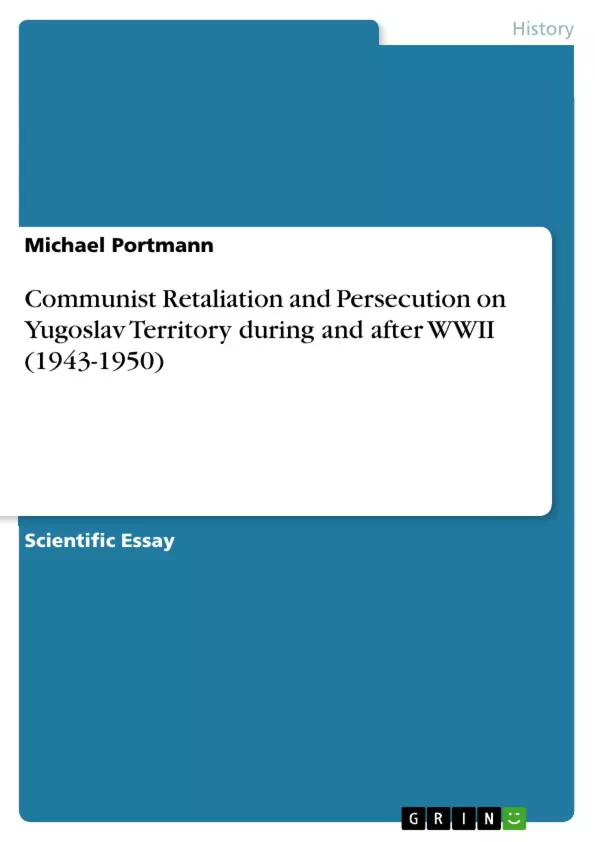The following article deals with repressive measures undertaken by communist-dominated Partisan forces during and especially after WWII in order to take revenge on former enemies, to punish collaborators, and “people’s enemies“ and to decimate and eliminate the potential of opponents to a new, socialist Yugoslavia. The text represents a summary of a master thesis referring to the above-mentioned topic written and accepted at Vienna University in 2002.
Inhaltsverzeichnis (Table of Contents)
- I RETALIATION AFTER WWII IN THE EUROPEAN CONTEXT
- II STAND OF RESEARCH AND SECONDARY LITERATURE
- a) Slovenian, Croatian and Serbian literature of the 1990ties
- b) Yugoslav-communist literature
Zielsetzung und Themenschwerpunkte (Objectives and Key Themes)
This article examines the repressive measures implemented by communist-dominated Partisan forces during and after World War II in Yugoslavia. It focuses on the communist retaliation against former enemies, collaborators, and perceived "people's enemies," highlighting efforts to suppress opposition and establish a socialist Yugoslavia. The text summarizes a master's thesis, investigating the consequences of these actions on the transformation of Yugoslavian society.
- Retaliation and persecution in post-war Yugoslavia
- The role of collaboration during the occupation
- The complex relationship between legal punishments, revolutionary jurisdiction, and retaliation
- The historiography of communist repression and its complexities
- The transformation process in Yugoslavia and its impact on various groups
Zusammenfassung der Kapitel (Chapter Summaries)
Chapter I provides a general overview of the historical phenomenon of retaliation and persecution during societal transformation processes, focusing specifically on the period following World War II in Europe. It highlights the scale and consequences of retaliation against fascism and collaboration, examining the different roles individuals played during the occupation and the complexities of determining responsibility.
Chapter II presents a comprehensive review of the available literature on communist repression in Yugoslavia. It explores different perspectives from Slovenian, Croatian, Serbian, and Yugoslav-communist historians, analyzing the historical context and the evolution of scholarship on the topic. It examines how different nationalistic and ideological perspectives have shaped the historiography of the period, highlighting the challenges of achieving an objective and comprehensive account.
Schlüsselwörter (Keywords)
This work focuses on the themes of communist retaliation, persecution, and the transformation of Yugoslavia after World War II. Key concepts include collaboration, "people's enemies," legal punishments, revolutionary jurisdiction, and the historiography of communist repression. It analyzes the diverse perspectives of Slovenian, Croatian, Serbian, and Yugoslav-communist historians, exploring the political and social dynamics of the period.
Frequently Asked Questions
What were the primary repressive measures in post-war Yugoslavia?
Repressive measures included retaliation, persecution, and the elimination of "people's enemies" by communist-dominated Partisan forces to secure a socialist state.
Who was targeted during the communist retaliation (1943-1950)?
The targets were former enemies, collaborators with the occupying forces, and any potential political opponents to the new socialist Yugoslavia.
How does the article address revolutionary jurisdiction?
The article examines the complex relationship between legal punishments, revolutionary jurisdiction, and spontaneous retaliation during the societal transformation.
What is the focus of the historiography discussed in the text?
It reviews Slovenian, Croatian, Serbian, and Yugoslav-communist literature from the 1990s, highlighting how nationalistic and ideological views shaped the history of repression.
What was the goal of these communist measures?
The main goal was to decimate the potential of opponents and to consolidate the power of the communist party in a newly established socialist Yugoslavia.
- Arbeit zitieren
- Dr. phil. Michael Portmann (Autor:in), 2004, Communist Retaliation and Persecution on Yugoslav Territory during and after WWII (1943-1950), München, GRIN Verlag, https://www.grin.com/document/49718



